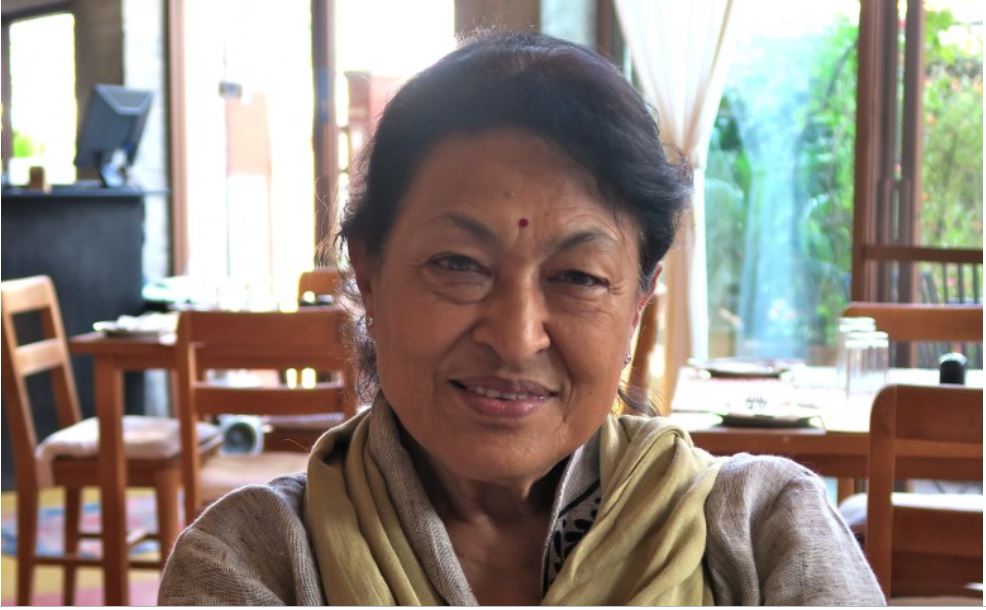Analysis
Accounting for Women’s Work and Female Entrepreneurship in Nepal
2015-10-19

Greetings to all of our NepalMonitor.org Blog readers! The Nepal Monitor team is creating a series of blog entries on women human rights defenders (WHRDs) as well as topics pertinent to women’s issues in Nepal. The purpose of this series is highlight some of the work, successes, and struggles of WHRDs and to faciliate some thoughtful discussions on women’s issues in Nepal. This entry marks the first one, and we look forward to your comments and suggestions to help us generate meaningful entries as we move forward in the series.
Recently, two Nepal Monitor researchers had the pleasure of sitting down with Bina Pradhan, a prominent academic and researcher who focuses on women’s issues in Nepal, specifically empowerment through entrepreneurship, and also accounting for women’s work, especially in the informal sector. After establishing a center for women’s development in Nepal during the 1980s, Ms. Pradhan was accepted for a Humphrey Fellowship and completed her PhD in rural sociology at Cornell University. She defended her thesis in Nepal, which focused on the reproductive health of Nepalese women. Ms. Pradhan advised policymakers on the National Plan after the conflict, and currently is doing research based on the national data on the workforce.
She has been serving as an advisor to the Federation of Business and Professional Women, primarily with the business development center. The center supports women and girls in a group setting or one-on-one basis, helping them to achieve as entrepreneurs in what is typically a man’s world in Nepal. According the Central Bureau of Statistics, there is an average of a 19% wage gap between men and women in Nepal.[i]
Ms. Pradhan explained that the issues women face are a joint legal and economic issue. Legally, women face discrimination in property rights in Nepal, which limits women in the kind of capital that they can afford to obtain, either in terms of tools, land, or financial credit. This serves to entrap women into doing work on a much smaller scale than they are capable of, limiting their activities to certain kinds of employment, such cleaning, farming, and small crafts. To combat this, the business development center strives to assist the women (many of which are young, domestically abused, or have lost their husbands) by connecting them with aid, product development, and branding. The center tries to help pave the way for their clients into bigger, less traditional activities such as tea and coffee trading. She is also working with a sample of women microcredit and cooperative initiatives in Nepal. She mentioned one cooperative of roughly 700 women she has been working with in Nuwakot who managed to collectively save a sum of money to lend out at interest, and she is also helping them to start a chilling plant to freeze foods, as well as a seed bank to preserve seeds. She mentioned that the area had been highly impacted by the earthquake this year, and the women had lost tools, livestock, and handicrafts, but are working to recover what they have lost.
Ms. Pradhan provided an example of how Nepalese women are actively involved in papermaking, but they are not in a position to receive a profit due to their lack of access to sophisticated techniques in creating the final product. “It is difficult for women to come up in Nepal,” Ms. Pradhan says, but the government is facilitating more research into women’s roles in the formal and informal sectors, which can help inform policymakers on ways to help women succeed. Ms. Pradhan herself has been working on analyzing the national data and also supplementing it with more qualitative work, some of which she completed with Tribuvhan University. With her recent research entitled, “Gender Accounting and Women’s Behavior in the Labor Market,” she explores how women choose different labor activities, and what is readily available for them. She has also worked on capturing the valuation of the work, and to show that women’s work has an impact on macro socioeconomic outcomes such as poverty and women’s development indicator.
To conclude, women’s work and entrepreneurship is often not adequately accounted for or valued in Nepal as much as their male counterparts, but the more research on the issues as well as the hands-on work with women that Ms. Pradhan is doing is critical to the future success of women in the country. Women should have a right to equal access to employment and entrepreneurship opportunities, fair wages, and business acumen. These are goals that people of Nepal need to work towards together, and the Nepal Monitor appreciates Ms. Pradhan’s contributions in this effort.
The Kathmandu Post. “Male-female wage disparity widens”. February 1, 2015,

